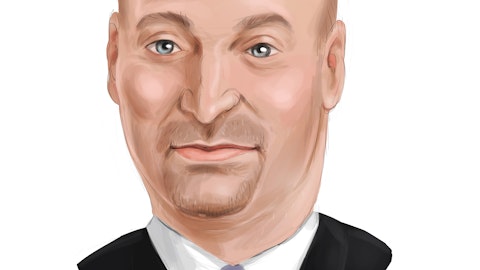Neal C. Bradsher‘s Broadwood Capital revealed in a recent Form 4 filing with the SEC that it has purchased an additional 2.43 million shares of BioTime, Inc. (NYSEMKT:BTX) in a registered direct offering, at a price of $3.29 per share, increasing its holding to more than 20.26 million shares. Following this transaction, Broadwood Capital now owns 25.5% of the outstanding shares of BioTime, Inc. (NYSEMKT:BTX), worth above $71.5 million at their current market price. In a separate form 4 filing, Julian Baker and Felix Baker‘s Baker Bros. Advisors disclosed that it has acquired an additional 50,000 shares of Mirati Therapeutics, Inc. (NASDAQ:MRTX) in a direct share offering, at a price of $45 per share and now owns over 2.95 million shares, representing almost 18% of the outstanding shares. Based on Mirati Therapeutics, Inc. (NASDAQ:MRTX)’s current share price, this stake is worth $131 million.

Neal C. Bradsher started Broadwood Capital, a New York-based healthcare-focused hedge fund, in 2002 after serving as a portfolio manager at Whitehall Asset Management and Campbell Advisors. According to the fund’s latest 13F filing, its U.S public equity portfolio was worth around $590 million and consisted of only six stocks. Although the fund has been a shareholder of BioTime, Inc. (NYSEMKT:BTX) for more than ten years and has continuously increased its stake in the company during that period, BioTime, Inc. still doesn’t land in the top three holdings of the fund. At the end of June, Monster Beverage Corporation (NASDAQ:MNST) and Mallinckrodt PLC (NYSE:MNK) represented Broadwood Capital’s largest holdings, respectively.
Follow Neal Clifton Bradsher's Broadwood Capital
At Insider Monkey, we track hedge funds’ moves in order to identify actionable patterns and profit from them. Our research has shown that hedge funds’ large-cap stock picks historically underperformed the S&P 500 Total Return Index by an average of seven basis points per month between 1999 and 2012. On the other hand, the 15 most popular small-cap stocks among hedge funds outperformed the S&P 500 Index by an average of 95 basis points per month (read the details here). Since the official launch of our small-cap strategy in August 2012, it has performed just as predicted, returning over 117% and beating the market by more than 60 percentage points. We believe the data is clear: investors will be better off by focusing on small-cap stocks utilizing hedge fund expertise (while avoiding their high fees at the same time) rather than large-cap stocks.
BioTime, Inc. is a California-based, mid-sized biopharmaceutical company that focuses on the field of regenerative medicine. Even after suffering a sharp decline from May until August, the stock of BioTime is only down by 5.11% year-to-date, thanks to the over 35% rise it had during the first four months of the year. Since the company announced the direct offering of slightly above 2.6 million shares on September 14, it is clear that Broadwood Capital was the major beneficiary of this direct offering. For the second quarter of 2015, BioTime reported a loss of $0.12 per share on revenue of $2.01 million, compared to a loss of $0.16 per share on revenue of $1.11 million that it reported for the same quarter last year. The number of hedge funds among those we track that reported a stake in the company went up by three to 14 during the second quarter. Israel Englander‘s Millennium Management was one of the hedge funds that initiated a stake in the company during that period, and held 63,094 shares of BioTime at the end of June.
Moving on, Baker Bros. Advisors is among the few funds that needs no introduction. Founded by brothers Julian Baker and Felix Baker in 2000, the New York-based fund has not only been one of the most successful healthcare-focused hedge funds in the last few years, but also the most successful hedge fund overall. The rapid M&A activity in the healthcare sector this year has resulted in Baker Bros. Advisors becoming the second-ranked hedge fund in terms of returns for the first half of 2015 among the funds tracked by Insider Monkey. Its stock picks with a market cap of over $1 billion generated a return of 108.3% on a weighted average basis through June 30. At the end of June, its U.S stock portfolio, which consisted entirely of healthcare stocks, was worth $11.4 billion and its top 10 holdings accounted for almost 80% of the value of its portfolio.
Follow Julian Baker And Felix Baker's Baker Bros. Advisors
Shares of oncology company Mirati Therapeutics, Inc. (NASDAQ:MRTX) have had a terrific rise of 141.9% year-to-date. However, more than 50% of those gains came in the past six trading sessions alone, after the company announced the first ever confirmed response in a patient suffering from non-small cell lung cancer with Axl Gene Amplification, who was treated with an orally administered small molecule inhibitor of MET. Following this announcement, analysts at Leerink Swann reiterated their ‘Outperform’ rating on the stock on September 10, while upping their price target on it to $50 from $35, followed by analysts at Wedbush Securities reiterating their ‘outperform’ rating and $45 price target on the stock the next day. During the second quarter, the number of hedge funds tracked by us that were long in the company declined by three to 11, however, the aggregate value of investors’ holdings in the company saw an increase of over $5.37 million during the same period. Apart from Baker Bros. Advisors, Kurt Von Emster‘s VenBio Select Advisor was another large shareholder of the company at the end of June, owning exactly 1.0 million shares.
Disclosure: None



